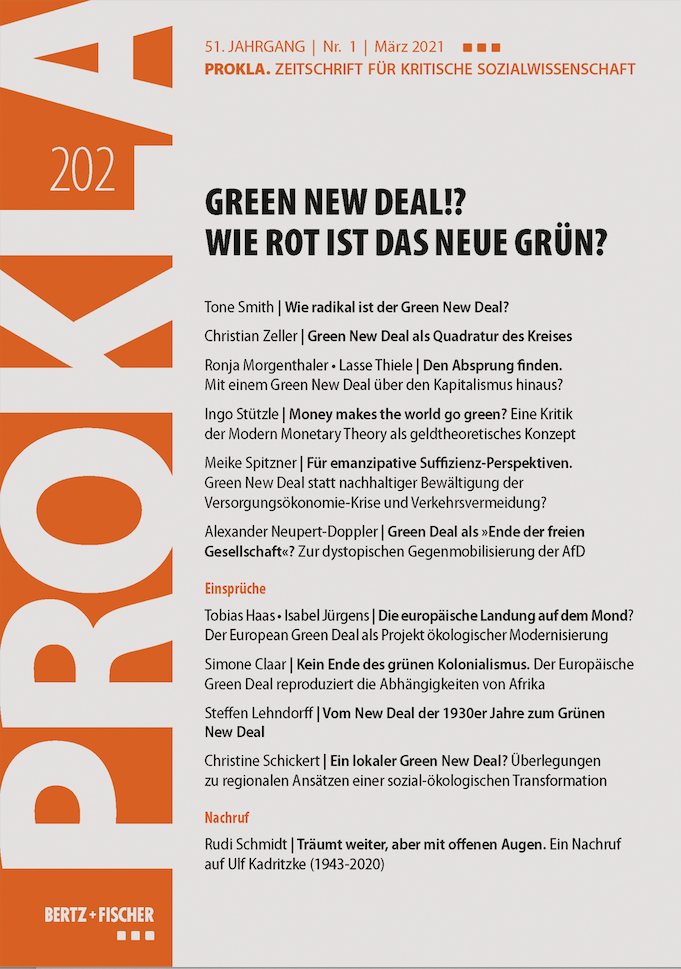Wie radikal ist der Green New Deal?
DOI:
https://doi.org/10.32387/prokla.v51i202.1928Schlagwörter:
Ökologische Ökonomie, grünes Wachstum, Degrowth, Arbeit, imperiale Lebensweise, UmweltökonomieAbstract
Die Idee eines Green New Deal (GND) ist nicht neu, aber in den letzten Jahren wurde eine Reihe von – mehr oder weniger radikalen – Vorschlägen entwickelt, insbesondere von linken Gruppen. Der Beitrag analysiert vier GND-Vorschläge und fragt, ob sie radikal genug sind, um eine Grundlage für die notwendige sozial-ökologische Transformation zu legen. Obwohl die Vorschläge viele progressive und radikale Elemente aufweisen, kommt der Beitrag zu dem Schluss, dass sie nicht weit genug gehen. Das Hauptproblem ist, dass ein New Deal seinem Wesen nach ein wirtschaftliches Wachstumsprojekt ist und damit den Mythos fördert, dass ein grünes Wachstum möglich ist.
Downloads
Literaturhinweise
Actionaid / Corporate Accountability / Friends of the Earth International / Global Campaign to Demand Climate Justice / Third World Network / What next? (2020): NOT ZERO: How ›net zero› targets disguise climate inaction. Joint technical briefing by climate justice organisations.
Adler, David / Wargan, Pawel (o.J.): 10 Säulen des Green New Deals für Europa. The Green New Deal for Europe.
Adler, David / Wargan, Pawel / Prakash, Sona (Hg.) (2019): Roadmap. Für Europas sozial-ökologische Wende.The Green New Deal for Europe.
Anderson, Kevin (2019): Brief response to the UK Government’s »net-zero« proposal. URL: https://kevinanderson.info/blog/brief-response-to-the-uk-governments-net-zero-proposal/, Zugriff: 15.10.2019.
Brand, Ulrich (2014): Social ecological transformation: a crossover project between the left and the greens?URL: https://www.degrowth.info/en/2014/05/social-ecological-transformation-a-crossover-project-between-the-left-and-the-greens/#more-26523, Zugriff: 1.12.2020.
Brand, Ulrich/ Wissen, Markus (2017): The imperial mode of living. In Spash, Clive L. (Hg.): Routledge Handbook of Ecological Economics. Nature and Society. Abingdon-New York: 152-161.
Candeias, Mario (2013): Green Transformation. Competing strategic projects. Berlin.
Chang, Ha-Joon (2011): 23 things they don’t tell you about capitalism. London.
Europäische Kommission (2019): Der europäische Grüne Deal. COM (2019) 640 final.
Galtung, Johan: A Structural Theory of Imperialism, In: Journal of Peace Research 8(2): 81-117.
GCEC (2014): Better Growth Better Climate. The New Climate Economy Report. Washington, D.C.
GCEC (2015): Seizing the Global Opportunity. The 2015 New Climate Economy Report. Washington/D.C.
Giampietro, Mario (2019): On the circular bioeconomy and decoupling: Implications for sustainable growth. In: Ecological Economics 162: 143–156. DOI: https://doi.org/10.1016/j.ecolecon.2019.05.001.
Graeber, David (2018): Bullshit Jobs: A Theory. London.
Hache, Frederic (2020): 50 Shades of Green. Sustainable Finance 2.0. The securitization of climate and biodiversity policies. Green Finance Observatory. Brüssel.
Hoffmann, Maja / Paulsen, Roland (2020): Resolving the ›jobs-environment-dilemma‹? The case for critiques of work in sustainability research. In: Environmental Sociology 6(4): 343-354. DOI: https://doi.org/10.1080/23251042.2020.1790718.
Kothari, Ashish/Shrivastava, Aseem(2012): Why Is India Still Poor? In: Yes! Magazine, June 2012.
Mair, Simon / Druckman, Angela / Jackson, Tim (2020): A tale of two utopias: Work in a post-growth world. In: Ecological Economics 173: 1-11.
Mazzucato, Mariana / McPherson, Martha (2018): The Green New Deal: A bold mission-oriented approach. UCL: Institute for Innovation and Public Purpose.
Muraca, Barbara (2013): Décroissance: A Project for a Radical Transformation of Society. In: Environmental Values 22(2): 147-169.
Sachs, Wolfgang (2015): Planet dialectics: Explorations in environment and development. London.
Simon, Frédéric (2020): France, Germany join group of 10 EU countries calling for green recovery. URL: https://www.euractiv.com/section/energy-environment/news/france-germany-join-group-of-10-eu-countries-calling-for-green-recovery/, Zugriff: 19.1.2021.
Spash, Clive L. (2016):The political economy of the Paris Agreement on human induced climate change: a brief guide. In: Real-World Economics Review 75: 67-75.
– (2020): Apologists for growth: passive revolutionaries in a passive revolution. In: Globalizations. DOI: http://doi.org10.1080/14747731.2020.1824864.
– / Smith, Tone (2019): Of ecosystems and economics: re-connecting economics with reality. In: Real World Economics Review 87: 212-229.
Stern, Nicholas u.a. (2006): Stern Review: The Economics of Climate Change. London.
Taylor, Matthew (2019): Labour members launch Green New Deal inspired by US activists (22.3.2019). URL: www.theguardian.com, Zugriff: 22.3.2019.
The Green New Deal Group (2008): A Green New Deal. Joined-up policies to solve the triple crunch of the credit crisis, climate change and high oil prices: New Economics Foundation.





